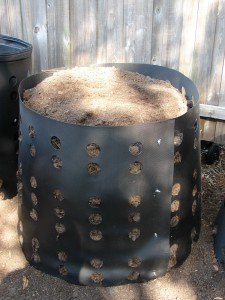 By Pam Brown, Urban Horticulture Extension Agent
By Pam Brown, Urban Horticulture Extension AgentCompost has been called black gold and it is lurking in the discarded yard and vegetable kitchen wastes. These wastes can be composted into a wonderful organic soil amendment.
Composting is the biological decomposition of organic wastes. In this case the organic wastes are ordinary vegetable and yard trimmings. This process happens naturally in the forests as leaves and other organic wastes decompose. And, you can do it in a controlled manner in your back yard.
Yard wastes make up about 20% or more of the collected municipal solid waste. Composting this material keeps it out of the waste stream and extends the life of landfills while at the same time produces a useful organic soil amendment. It is part of a commitment to recycling.
There are several ways to allow this organic decomposition to take place. One simple way is to let leaves from your oak or other trees fall to the ground around the tree and decompose there. This is a type of composting. Or, you can pile those leaves into a container at least 3x3x3 along with other yard trimmings that have been chopped (run over them with your lawn mower) and vegetable wastes, coffee grounds and egg shells from your kitchen. Turn it occasionally and keep it moist. In a few months you will have great compost to add to your garden beds. You do not want to put animal wastes, bones, oils, fat or dairy products into your compost. They will decompose, but they will probably attract unwanted critters to your pile.
Adding compost to your garden and landscape helps create good soil structure. It helps our sandy soils retain water and nutrients so that they are available to the plants for a longer period. And, compost feeds the diverse critters in the soil that are necessary for healthy soil. Soil enriched with compost contains lots of beneficial insects, worms and other critters that burrow through the soil and keep it aerated as well as beneficial microbes that can actually protect plant roots from soil borne diseases.
We periodically present “Compost Happens” classes where you can learn all about composting and possibly take home a compost bin as a door prize. Check out our web site at http://pinellascounty.org then click on “calendar” to find the dates of the next classes. You can register on-line as well.
For more information, please access these University of Florida/IFAS Extension publications or watch our short video.
Compost Tips for the Home Gardener
http://edis.ifas.ufl.edu/document_ep323
Construction of Home Compost Units
http://edis.ifas.ufl.edu/document_he026
 0
0
